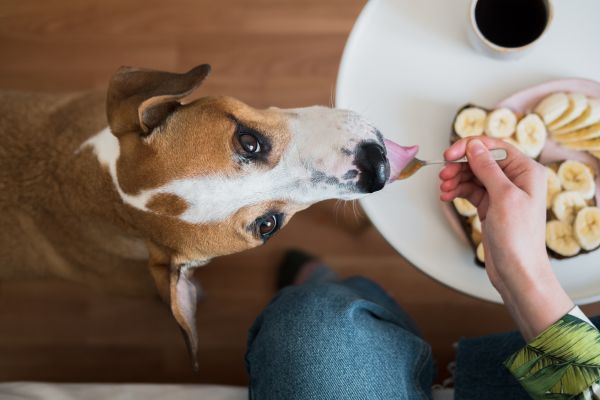Connect with a verified veterinarian in minutes. Licensed vets are available 24/7 to answer your questions. No need to worry about your furry family member.
Do you sometimes share food with your dog? Does he lick your food, and then you eat it? This is not uncommon with some pet parents. They have no problem sharing their food with their dog! Some people love to share ice cream with their fur babies! But is it OK to eat food your dog has licked?
Have you eaten food that your dog licked? Are you worried the food could make you sick? If so, you’ve come to the right place. We understand it can be concerning to eat after your dog has licked your food.
We’ve put together some information about eating food your dog has licked and whether this can make you sick. Let’s get started!
Can You Eat Food Your Dog Has Licked?
The simple fact is that dog saliva does contain germs and bacteria, some of which can make us sick. And if you’re allergic to dogs, this includes their saliva, too. Eating food licked by a dog could cause an allergic reaction in people with severe dog allergies.
What’s more, dog saliva is easily absorbed by the mucus membranes found in the mouth, nose, and eyes.
So, while it is possible to get sick from eating food your dog has licked, this isn’t really all that common. Even though many pet parents eat food their dog has licked. However, there are some things to be aware of.
Possible Issues
There are some potential issues that could develop after eating food your dog has licked, including:
Getting a parasite: it’s possible a dog’s saliva could contain a parasite. Think of where your dog licks, such as under his tail. In that case, a parasite could be transmitted from your dog to your food. Yuck!
Upset stomach: another problem is that dogs put their noses in many places, including under their tails, under other dogs’ tails, in garbage, contaminated water, and more. When a dog does this, he could pick up bacteria and germs that are then transmitted to your food after he licks it. You could develop an upset stomach, vomiting, and diarrhea depending on the bacteria or germs you picked up.

Review symptoms, medications & behavior to keep your pets healthy with a Vet Online in just minutes.
Ask a Vet Live NowCan Eating Food Your Dog Has Licked Make You Sick?
The answer is a yes, though it depends. If you have a suppressed immune system, eating food your dog has licked is not recommended. You could pick up a pathogen that your immune system can’t handle and become very sick as a result.
And if you have dog allergies, it’s also not recommended to let your dog lick your food.
In healthy people, the chances of getting sick are minimal; however, it is possible. You could pick up harmful bacteria, parasites, and more.
Overall, eating food your dog has licked is not recommended. It’s OK to share some of your food with your dog, just make sure to give him his own portion. Don’t allow your fur baby to lick your food.
And remember never to give your dog any human food that contains ingredients that are toxic to dogs.
By following these tips, you can ensure your and your fur baby both stay happy and healthy!
Connect with a verified veterinarian in minutes. Licensed vets are available 24/7 to answer your questions. No need to worry about your furry family member.

Julie
Julie is a graduate of the University of North Carolina, Wilmington, where she studied Animal science. Though contrary to the opinion of her parents she was meant to study pharmacy, but she was in love with animals especially cats. Julie currently works in an animal research institute (NGO) in California and loves spending quality time with her little cat. She has the passion for making research about animals, how they survive, their way of life among others and publishes it. Julie is also happily married with two kids.
Review symptoms, medications & behavior to keep your pets healthy with a Vet Online in just minutes.
Ask a Vet Live Now

